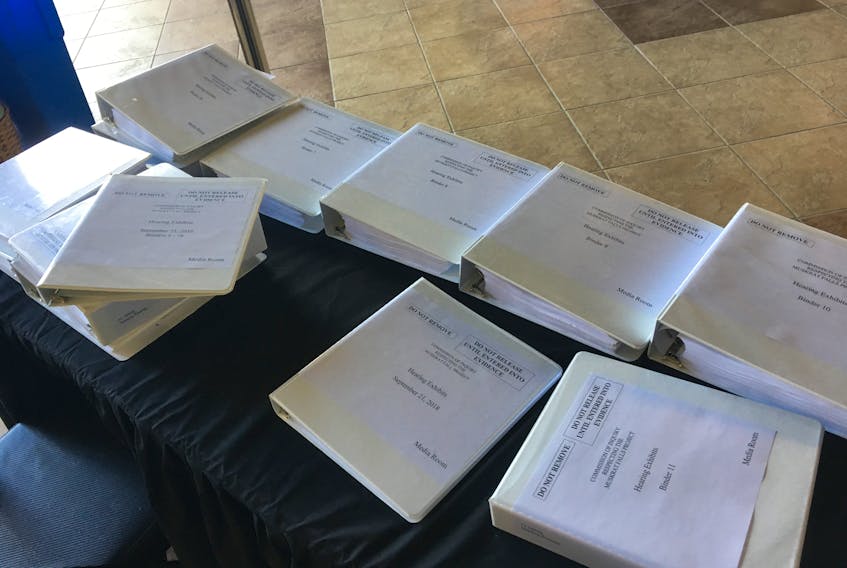Auditors with Grant Thornton told the Muskrat Falls Inquiry on Friday about “potential misstatements” by Nalcor Energy in considering Newfoundland and Labrador’s power options in the lead-up to the sanctioning of the Muskrat Falls hydroelectric project.
But on Monday, auditors David Malamed and Scott Shaffer were cross-examined and challenged on those findings, and on the determination Nalcor Energy “may have inappropriately eliminated” two options for the supply of power.
Nalcor Energy lawyer Dan Simmons, through questioning, introduced more information on the risks considered in weighing the “isolated Island” option for Newfoundland’s power grid — offered as the reasonable alternative to Muskrat Falls. That included the risk in the island’s continued reliance on fossil fuels, as would be needed for the Holyrood thermal power plant.
There was the unknown of swings of fuel prices over time, but also significant maintenance costs associated with maintaining the aging Holyrood plant. Without dispute from the auditors, Simmons noted additional unknowns were tied to environmental concerns and policy related to greenhouse gas emissions (in the form of a possible carbon tax).
RELATED STORIES:
HIGHLIGHTS: Week 1 of Muskrat Falls Inquiry
Auditors bring ‘best option’ decision into question
While carbon pricing has since been mandated by the federal government, it is an unsettled matter between the provincial and federal governments even at this point as to how much will be paid due to emissions from the Holyrood plant in its final years.
More than once, Grant Thornton’s auditors felt obliged to re-state the qualifiers included in their report, saying they relied at many points on the testimony of experts, and their findings offered observations as opposed to criticisms or value judgments on the decisions made.
The auditors said there was no judgment, for example, in finding Nalcor Energy did not undertake talks with Hydro Quebec on the potential for power sales to Newfoundland and Labrador, before furthering the Muskrat Falls project. It was a basic finding only — that formal talks weren’t undertaken.
In his questions, Simmons began to further address the idea the company “should or shouldn’t.” He referenced historical disputes, before asking if it would have been reasonable at the time for Nalcor Energy to think the utility next door would sell power to Newfoundland and Labrador for less than it might in another market, such as the northeastern United States. He also asked about the auditors’ awareness of evidence provided by Halifax-based utility Emera to the utility regulator in Nova Scotia, on Emera’s own lack of ability to secure a long-term, fixed-price power commitment from Quebec.
“Our investigation was not about Emera,” Malamed said in response.
Another option for power reported by the auditors as possibly having been eliminated too soon by Nalcor was the option to hold out until 2041, and the expiry of the contract governing operation of the Churchill Falls hydro plant. Simmons pointed out that station and related infrastructure is controlled by the Churchill Falls Labrador Corp. (CFLCo) and not wholly controlled by Nalcor Energy.
Given that, the auditors were asked how well they understood what would be possible for Newfoundland and Labrador in 2041.
“I believe the (power) contract ends. Then I don’t know what happens after the contract ends,” Malamed said, reiterating it was only an observation of the auditors that the option was set aside early on.
There was evidence introduced of other electrical utilities, including Manitoba Hydro and B.C. Hydro, making use of P50-level estimates, a probability rating for estimates, as opposed to a higher figure – supporting comments made by former Nalcor Energy president and CEO Ed Martin following the release of the audit report that the approach to Muskrat Falls was not unique.
Representing the province (not the sitting government), Peter Ralph posed several questions before Simmons and established the auditors really did not take issue with the use by Nalcor Energy of Department of Finance forecasts for population numbers, housing starts and other figures in their calculations.
“It’s not a criticism, it’s just an observation,” Malamed said of the auditors’ note of a reliance on the numbers and the difference between some of those figures and the Conference Board of Canada’s figures.
Final determinations on the significance of the auditors’ observations will ultimately fall to Commissioner Richard LeBlanc.
The Grant Thornton audit report is scheduled to continue as a focus at the inquiry into Wednesday, as Malamed and Shaffer take further questions. They are scheduled to be followed on the witness stand by a panel from Nalcor Energy.









